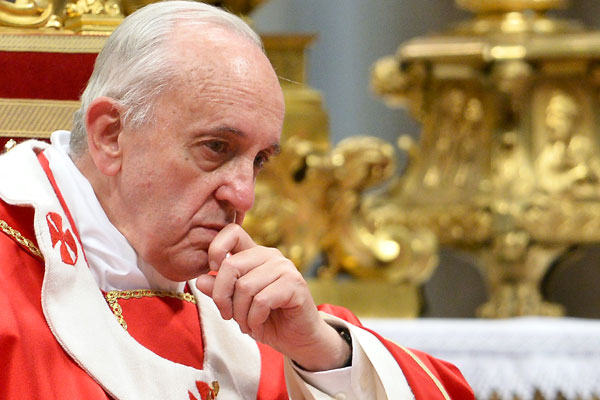The people of Rome have always liked to believe the worst of their bishop. When I was a correspondent in Rome more than 40 years ago, I was constantly assured by its citizens that the Pope not only had the evil eye but was known for a fact to be living secretly in the Vatican with a male ballet dancer. These were absurd rumours. Not only did Paul VI have rather dull eyes; he was also a cautious, unexciting fellow, a dry bureaucrat who had served for decades in the Vatican’s Secretariat of State before becoming archbishop of Milan and, after that, pope. I doubt if he had ever met a ballet dancer. Probably the juiciest scandal that occurred on his watch was the sudden death of the reputedly austere French Jesuit theologian, Cardinal Jean Daniélou, in the home of a Paris prostitute in 1974.
But now the Vatican is engulfed by real scandal. Pope Francis, who was elected only last March, informed visitors himself recently that there was a ‘gay lobby’ inside the Vatican, thus lending credence to reports that had appeared in the Italian press about Vatican officials holding ‘bunga bunga’ parties with under-age male prostitutes and exposing themselves to blackmail from outside the Vatican’s walls. And as I arrive in Tuscany for a summer holiday, I pick up a copy of the weekly news magazine L’Espresso to find it has a cover story adding to the Pope’s woes. Written by a Vatican expert, Sandro Magister, this claims that the man the Pope has appointed to be his personal representative at the Vatican Bank, an institution now being investigated for money-laundering, corruption and fraud, is a prelate with a lurid homosexual past.
Monsignor Battista Ricca, 57, is, among other things, the director of the Domus Santa Marta, a hotel inside the Vatican for visiting prelates in which Pope Francis has decided to live, and he often eats with him in the dining hall there. The Pope, it seems, has come to like and trust Mgr Ricca, but has been deliberately kept in the dark about the allegations against him. These concern his time around the turn of the century when he was employed by the Vatican diplomatic service and posted at various missions abroad. In Berne he allegedly made such friends with a Swiss army captain called Patrick Haari that he took him with him to his next posting in Uruguay and managed, despite objections, to get him a job, a salary and a bed in the papal nunciature. Mgr Ricca also allegedly frequented a gay hang-out in Montevideo where he was once beaten up and taken home to the nunciature with a swollen face. Then, when the lift in the nunciature got stuck one night, Mgr Ricca was apparently found inside it with a young man known to the police authorities.
The Pope has stood by Mgr Ricca, authorising his press spokesman to deny the allegations against him and to describe the L’Espresso report as ‘not trustworthy’. But according to Sandro Magister’s article, the allegations were known to dozens of people in Uruguay, including bishops, priests and nuns; and it is alarming that none of them saw fit to inform the Pope about them. It was thus in ignorance of these allegations that he decided to promote Mgr Ricca to an important and sensitive new position. It shows what the Pope is up against as he embarks on his ambitious programme of Vatican reform and promises to do so with the utmost transparency.
The more one thinks about the sorry state of affairs in Rome, the less likely it seems that Pope Benedict XVI’s abdication was motivated only by his age and frailty. He may well have felt sick to his stomach about the problems with which he had to deal. As head of the Congregation for the Doctrine of the Faith, the post he held before becoming pope, he had been in charge of investigating the child-abuse scandals in which thousands of Catholic priests around the world had been involved. Then he learnt to his horror that there existed a network of gay priests within the Vatican itself, and finally that his strongest supporter in opposing gay marriage and gay sex in general, Cardinal Keith O’Brien, Archbishop of St Andrews and Edinburgh, had himself been having a long homosexual affair with one of his priests. Who could blame him for wanting to pack it in? As for Pope Francis, a visit to riot-torn Brazil amid huge security concerns may very well feel like an agreeable holiday.
Got something to add? Join the discussion and comment below.
Get 10 issues for just $10
Subscribe to The Spectator Australia today for the next 10 magazine issues, plus full online access, for just $10.
You might disagree with half of it, but you’ll enjoy reading all of it. Try your first month for free, then just $2 a week for the remainder of your first year.













Comments
Don't miss out
Join the conversation with other Spectator Australia readers. Subscribe to leave a comment.
SUBSCRIBEAlready a subscriber? Log in